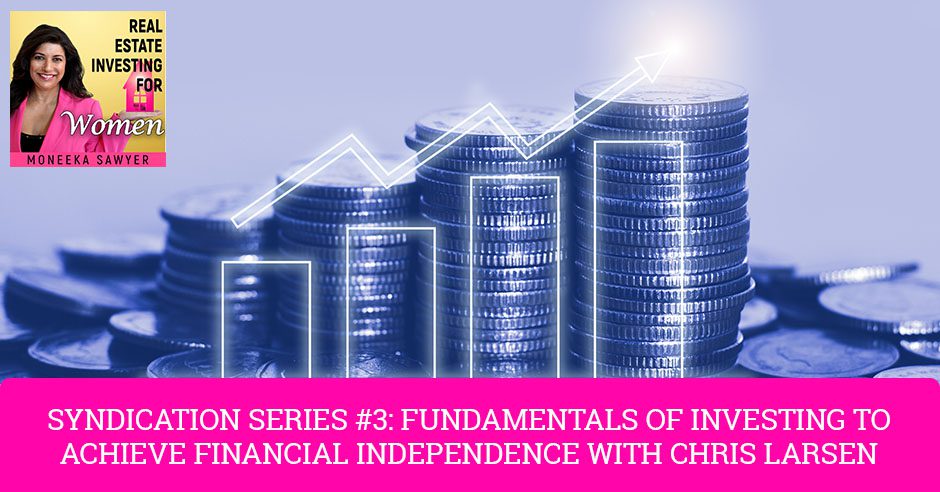Syndication Series #3: Fundamentals Of Investing To Achieve Financial Independence With Chris Larsen

Real estate is the best path towards achieving financial independence. Becoming financially independent means having the choice to do what you want with your time. In this episode, Moneeka Sawyer sits down for some great insights into real estate with investor, author and entrepreneur, Chris Larsen of Next Level Income. We hear Chris narrate what got him into real estate, starting from single family to commercial real estate. Chris also shares his investing strategy and how Infinite Banking works, and how to leverage your insurance policy for cashflow. Drop by and listen in as Chris and Moneeka share valuable information for investors to use.
—
Watch the episode here
Listen to the podcast here
Syndication Series #3: Fundamentals Of Investing To Achieve Financial Independence With Chris Larsen
Real Estate Investing For Women
In this episode, I am so excited to welcome to the show, Chris Larsen. He is the Founder and Managing Partner of Next-Level Income. Chris has been investing and managing real estate for several years. While still a college student, he bought his first rental property at the age of 21. I love people that get into this industry young.
From there, he expanded into development, private lending, buying distressed debt, as well as commercial offices and ultimately syndicating multifamily properties. He began syndicating deals in 2016 and has been actively involved in over $225 million of real estate acquisitions. He is passionate about helping investors become financially independent. Chris, welcome to the show.
Thank you so much for having me. I’m excited to be here.
I’ve been looking forward to this show and you’ve been so patient with me with all the rescheduling. Thank you. I’m glad we’re finally here. Chris, give us a high level of your story. I know it’s very exciting.
First off, I love that you bring up to get started early. Now it’s early, whenever you can do it. I was 21 when I was in college. My passion at the time was racing bicycles. I went to Virginia Tech for Biomechanical Engineering. I did pretty well in school and I was told like, “You should be an engineer like your grandfather.” All I want to do is race bicycles.
Cycling is like a real engineer sport because it’s all about numbers and power to weight ratios. At that time, drug which I wasn’t into. That was the end of my story in a lot of ways because I didn’t want to do that. Along the way, at that same time, when I was at this turning point, trying to decide what to do as I was looking towards a professional career, my best friend, roommate and training partner passed away. He had a massive brain hemorrhage between my freshmen and sophomore year in college.
I poured another year into the sport and then I realized even after I was winning more and more races, that I wasn’t happy. Even though my team went professional, I didn’t. I stepped away from the sport, went back to school. As a junior in college, I thought like, “What the heck am I going to do with my life? I don’t want to be an engineer. I was going to go race and then figure out what I wanted to do.” While I was racing and even when I was young, the first thing I remember and probably if you’re reading, you think the same thing. You hop on your bike and you have this tremendous sense of freedom. That’s what I wanted.
I wanted the freedom to live life on my own terms to respect not only the life I was giving them but also the life of the friend that I lost. I turned towards investing. I was introduced to it by the same gentleman, Clint Provenza, who introduced me to cycling. My father passed away at five and he was a real mentor to me. I started looking into investing. I was day trading, and one of those nights/mornings that 3:00 AM, when I was laying there in bed, thinking about what I should do with my trades. I thought like, “Do I want to be doing this twenty years from now?” The answer was no.
I looked at other investments. I read over 250 books on money, investing and settled on real estate because you could control it. I bought my first property at 21. I built and managed a portfolio of single-family rentals for fifteen years but ultimately transitioned into commercial real estate. That’s what we focus on. I try to enlighten people and share my mistakes, so they can take the fast track to get towards financial independence, which took me a couple of years.
It’s so interesting. I have a very similar story in that. I wanted to be a dancer and that was my thing. I came to investing for a similar reason. I wanted a life of choice. I think that freedom of choice is our true wealth. That’s what I wanted and real estate allowed that. It did take me several years before I could say I could retire, my husband and I, but I couldn’t do with the lifestyle that I wanted in California. We would have had to move, so we continued to grow our portfolio, but it was the same thing. After several years, we are doing everything now that we’re doing because of the choice and we want to do that. There’s nothing more liberating than that.
At some point, income is important, but it’s the freedom to choose that brings happiness.
I think studies show. I teach a financial literacy course here. It’s high school students coming out of underprivileged homes. Most of them are living below the poverty line. We had a conversation about, at some point, income is important, but it’s the freedom to choose. I cited the study that shows the janitors that have freedom in their day-to-day choices are happier than the CEOs that are making 10,000 times now what they are, but they’re not happy because they don’t have freedom.
My TED Talk is about this and there’s a lot of research about there’s a threshold where money does buy happiness to a certain threshold. The original number they came up with within 2010 was $75,000, but a study was done in January 2021 that said it was $100,000. It’s gone up because of inflation. Whatever that number is, it’s $100,000 now.
Up until then, the number of dollars that you bring into your household does relate directly to the level of happiness in the household or the level of satisfaction. After that, now we have freedom and excess income. We are taken care of and now we can focus on joy, bliss. I’m so glad we’re on the same wavelength around that. Tell me about this concept of infinite banking.
Next-Level Income was born of this desire to curate information around financial literacy and education. As I built it out, we have three main areas. We talk about how to make, keep and grow your money. Those are the three steps. I have coaching clients and that’s what we work through like, “How can you maximize how much money you’re making? How can you keep more money?”

Financial Independence: Freedom of choice is our true wealth. Real estate allows that.
Thank you so much. Talk to me about your perspective on multifamily. This is a hot topic with my ladies.
I call multifamily real estate the holy grail of investing. If you look at my book, it says How to Make, Keep, and Grow Your Money Using the ‘Holy Grail of Real Estate’ to Achieve Financial Independence. I’ll send you a copy for free if you go to the website. I’m so high on multifamily. I was the person that managed my portfolio for fifteen years.
I was the person that got the phone call on my honeymoon in Costa Rica and paid $40 and collect call fees to deal with a problem tenant. I was the guy that stayed in too long and didn’t get a great return on my properties. I was also the guy that was fortunate enough to run into somebody that introduced me to this space. I started to investigate multifamily real estate and I’m a demographics guy. I spent eighteen years in the medical device industry. That’s how I made the money to invest. I got into a medical device.
I moved and lived in Asheville, North Carolina, because we have great demographic trends. When I started to investigate multifamily being an engineer, day-to-day guy and analytical, I found that multifamily was supported by these terrific demographics by what we now call the Millennials. They rented and guess who’s supporting multifamily now? It’s their parents, the Baby Boomers. They’re selling their homes and renting and now Gen Z is renting as well. We’ve turned into this nation that we like to own the American dream, but also flexibility.
I jumped into multifamily because of the demographics and the analytics. My MBA is in Portfolio Managementhat I found is something that Ray Dalio calls The Holy Grail of Investing, which allows you to increase the Sharpe ratio. The Sharpe ratio increases the returns of your portfolio and decreases the risk. It’s like a boat that goes faster and it has less bumps when you’re on it. I thought, “What is better than that?” Ray Dalio calls that The Holy Grail of Investing. I call multifamily the Holy Grail of Real Estate because it allows you to increase the returns in your portfolio and allows you to decrease the risk.
I know that in EXTRA, we’re going to talk a lot more about multifamily. We’re going to go deeper to the pros and cons of multifamily and then he’s going to do some number breakdowns for us. These are things that I get asked about a lot. It’s not my strong suit. My husband and I have not been involved yet in multifamily. The commercial evaluation of the numbers is not his strong suit, so he hasn’t had to do it yet. This will be fun. EXTRA will be talking a lot about that stuff, but why don’t you give us a high level on why you like multifamily? What’s so exciting about it?
There are a few things. If you’re reading and you’re like, “I love real estate, but I don’t want to be the person that has to go in and fix toilets, find new tenants, screen people and do showings and all that.” I get that because I’ve done it. The big thing is if you invest in multifamily with an experienced operator, it’s 100% passive. You can invest, be a direct owner, get the income, the depreciation and the depreciation of great tax benefits, especially if you’re a high-income earner, but you don’t have to deal with it all yourself. That’s fantastic. It’s scalable.
You could buy a 100 unit multifamily building for $10 million. You could buy a $1 billion multifamily portfolio. Whether you’re investing in your first deal or you’ve been investing for twenty years and you’re looking to place $1 million or $10 million of capital, you can use the same strategy. It’s very scalable. There’s something that I like even more, it’s the control. You might’ve heard me talk about laying in bed at 3:00 AM feeling like things were out of control with my money. I like real estate because you can control it.
We’re acquiring a property in Greenville, South Carolina and we live in Asheville, which is about an hour away. We were down in South Carolina for my son’s 9/11 lacrosse game. I took him to the property and we drove around. It was built in 1997. It’s a little beat up. The stairs needed to be replaced. They need new paint. We can control all of those things. If you own a business, apartments are valued like a business. They’re valued by net operating income. If you live in your home or you have a rental home and it’s 1,000 square feet, and it sells for $300 a square foot, it’s worth $300,000. It’s easy math.

Financial Independence: Next Level Income was born of this desire to curate information around financial literacy and education.
The bank figures that out because they say, “The home on your right is worth $305 a square foot, on your left is worth $295 a square foot.” Yours is about $300 a square foot. You don’t control that. The market goes up and down. If we go and buy an apartment building for $10 million and it has $1 million of net operating income, that’s probably not a great metric. Call it a $20 million apartment building with $1 million in net operating income.
We increase the net operating income 50% from $1 million with a $20 million to $1.5 million new valuation. You’re probably thinking to yourself when your cap rate is $30 million. We control that when we’re able to move the rents by the renovations, operations, being more efficient, bringing better management and those sorts of things. Again, it’s passive and scalable, but most importantly, it’s controllable.
I’m sure some of you are like me going, “Wow,” but we will break this down so you can go through this again and we’ll break down more of that in EXTRA so we can take it a little bit slower. I feel like you already covered this. What are the important metrics? What exactly should we be looking at?
I’ll dive a little deeper again. We can unpack this a lot more in the EXTRA section. I started as an investor in these deals. I was called a limited partner before I syndicated these deals and became a general partner. If you’re a limited partner and you say, “I’m interested in this.” You need to look at three different things. You need to look at geography. Are you investing in an area of the country that people want to move to? I wrote a whole blog post about this. I talked about how you can identify these. It’s very easy to see with reports from companies like United Van Lines. You can go on our blog at the beginning of 2021 and read the post I put on there.
You want to be in large cities where people are moving, that is growing faster than the national average. Where are these cities? A lot of these are from the Southeast. I moved to North Carolina for the demographics, the Carolinas, Florida, Georgia, Texas, Phoenix, Colorado and Boise, Idaho seems to be a big one here. Why are people moving here? They’re moving out of California to places like Colorado, Texas and Idaho.
They’re moving to the Southeast from places like California, LA, New England and New York. The places that are cold and don’t have a great quality of life. Taxes are going up. I have a coaching client. He told me and he’s like, “We’re looking at South Carolina to move. Taxes are going up. We don’t want to live here anymore.” Number two, the operator. Are you working with an operator? This is somebody that’s going, finding and buying the property. That’s going to bring you in alongside them and then they’re going to operate it. They’re going to increase that net operating income.
Have they done it before? Have you done it in the geography that you’re invested in? What is their experience there? You want to ask him some tough questions about what’s their strategy. You look at the metrics in the deal. That’s pretty complex. We looked at over two dozen different metrics on the deals that we’re in, and there are a lot of different variables that come into play. Again, if you’ve ever invested in a business, if you’re a business owner or professional, you can read a financial statement.
That’s the thing. If you call me and say, “I’m interested in this deal.” As an owner of this property, you’re entitled to all the same information that you would be entitled to if you own a single-family home. You can go through those and you can call the operator and say, “Walk me through this. What am I seeing here and there?” Don’t be afraid to ask those questions and understand the numbers, strategy and why an operator is going into the market.
Talk to me a little bit about ROI. Different operators do this differently. Tell us a little bit about how you structure your deals for your investors.
What we do is called syndication. Syndication is very simple, it is someone, an operator going out and bringing in investors alongside them to invest. What’s important is how that syndication is structured. What we do is we do what’s called a preferred return. If you look at deals, say 6% to 8%, what does that mean? That means investors get the first 6%to 8% of the returns coming from that property. Investors are preferred in front of anybody else. They’re going to be subordinate to the lender.
The other thing that’s nice about these properties is it’s called non-recourse debt. I work with a lot of doctors after spending several years in the medical device profession. They don’t want more risk, more debt and a bank to come after them for something. They have patients that are out for them if something bad happens. That’s a nice thing about these properties as well.
After taxes, the next biggest expense that a lot of people don’t think about is financing.
After the lender, the investors get that preferred return. There’s an equity split. That split is a large part that goes to investors and then the partners that organize these deals get the minority position in there, but that’s the incentive. You want to work with the group, in my opinion. How we do it is we give the investors the first big portion of the returns, about a half of the returns upfront. The other half comes from that split on the backside and then we as partners get a piece of that split.
We’re incentivized to maximize the profit of that property on the backend. You asked a question there and I’ll address this. There are a couple of different ways to look at this. You can look at a total return. You’re going to get a 10% return comprised of half cash and half appreciation on a property. There’s also an equity multiple. You’re going to double your money over a certain period of time, it’s another way to look at it. There’s also what’s called the IRR, the Internal Rate of Return.
We can dive deeper into the EXTRA portion of the show or you can go ahead and check out my book, which goes deeper into this as well. You can always read on a site like Investopedia, which dives deeper too. It depends on what type of investor you are. Maybe cash or the total return is important to you. It all depends on what type of investor you are.
Do you pay investors immediately? When they first invest money, are they guaranteed a certain return each year while the project is happening? How do you structure that for your people?
One little red flag is we never say guaranteed because these are investments that have a risk associated with them. If you ever hear me say guaranteed, you should either slap me on the face with a stick and a paper towel or something in my mouth too. We have a couple of different types of investments. We have investments that we pay investors a fixed return based upon the performance of the property. Our group pays out monthly. We like to pay out monthly. There are groups that payout quarterly. It’s not necessarily better or worse, but personally, I like to get money in my account every month.
You then get some stuff on the backend depending on how the project goes.
In multifamily syndication, you’re going to get regular cashflow monthly, quarterly or annually. When the property sells, think about it like a rental property. You’re getting rent. If you’re renting it out for $1,000 a month and your expenses are $900, you might get $100 a month. When you sell it, if you bought a property for $100,000 and you sell it for $150,000, you get that $50,000 profit on the backend. It’s very similar to that.
Do you guys do the whole refinance structure piece too or do you go for the sale?
When we model out the returns on a property which is called the pro forma, we don’t assume we’re going to refinance the property. If you’ve ever owned a rental property or you have a property of your own, what’s nice is if you have a HELOC, a Home Equity Line Of Credit and you pull money out of your home or an investment property, you don’t pay taxes on that when you pull that money out.
You might pay taxes when you sell it, but you don’t pay taxes when you pull it out. It’s very similar to what we do. A lot of times, we look to do that if the property is performing. We don’t tell investors that’s part of the plan because we want to be a little bit more conservative than that but that is a very optimal way to pull an investor capital out in a tax-efficient manner.
While we dove pretty deep into all of that stuff and I know we’re going to get even deeper, so definitely stay tuned for EXTRA. We’ll be talking more about the fundamentals of multifamily investing and the numbers around that and also the why or why not to do it.
Before we move into our three rapid fire questions, I want to let you ladies know how you can get in touch with Chris because he’s amazing, isn’t he? He’s got two awesome offers for you today. First of all, he’s going to give you his book for free and he and I are holding a webinar together so that you can meet him live and ask as many questions as you’d like.
Learn how you can invest like the rich to create true freedom for yourself by getting a free copy of his book nextlevelincome.com/bliss, where he’ll send you a copy of his book for free.
Also join Chris and me for a free webinar designed just for you to get informed and ask questions about how Chris does syndication and how he can help you to save the date. December 2nd, at 4:00 PM Pacific time. Go to blissfulinvestor.com/syndicationwebinar. That’s blissfulinvestor.com/syndicationwebinar.

Financial Independence: Syndication is very simple. It’s an operator going out and bringing in investors alongside them to invest.
I didn’t tell you this, Chris, but we have three rapid-fire questions. Are you ready?
I love it. I’m ready. I told you I’m wide open here, so let’s do it.
Tell us one super tip on getting started investing in real estate.
The best tip I can think of is to find somebody that has gone down the path you want to go down and either ask them for advice or hire them to help be a mentor.
What would you say is a strategy to be successful in real estate investing?
I think success, in general, is habits. Whether you want to be successful in real estate, successful in life, losing weight or whatever it may be, you need to focus on your daily habits. If you want to be successful in real estate, that may be in as far as syndications or passive investments or reviewing a deal every day or every week. If you are going out and buying your own properties, that may be contacting brokers, making phone calls and getting options out there that are coming in towards you on a regular basis.
What would you say is one daily practice that you do that contributes to your personal success?
I’ve learned a lot over the past years. I bought my older son The Five Minute Journal for Kids. It is basically a gratitude practice. I know you’re big on this. I think happiness comes before success. You have to get in that right mindset, the abundance mindset, which is what you share. You know that success and that money will come to you and there’s always a deal out there. You don’t have to worry and fight over these things. Share, help other people and other people will help you get in the right mindset. That’s what I try to do every day.
This has been an amazing show. Thank you so much for all you’ve already contributed, Chris. This has been great.
It’s my pleasure. Thank you so much for having me.
Before we close out the show, I want to head off any confusion we might have about upcoming webinars. So in order to make this series the most valuable possible for you, I have arranged to have two webinars during the next couple of weeks.
The first one is going to be with Dr. Sam, who you heard from a couple of weeks ago. He is an investor just like you ladies. And he has figured out how to evaluate syndication opportunities that come across because he gets a lot of them. And if you’re interested in them and you put your name out there, you will start to get a lot of them. You’ll learn how he evaluates them so he can figure out which projects are the best for him regarding his risk tolerance, his capital availability, and what kinds of projects he’s actually interested in, like location and that sort of thing.
Dr. Sam has developed a tool he’s now sharing. So we’re going to do a webinar with him and you can talk to him about what it’s like to be an investor in syndications and what to expect. And then also he’s going to go through his tool specifically and show you how he’s evaluating different projects. So I’m really excited about this because you actually get to have a conversation LIVE with another investor who’s actually doing investing in syndication projects. So in order to sign up for that webinar, go to blissfulinvestor.com/Samwebinar. So that’s for Dr. Sam, right? So blissfulinvestor.com/Samwebinar. And that webinar is going to be held this week on Thursday, November 18th at 5:00 PM Pacific time. So again, that’s Thursday, November 18 at 5pm pacific time. Go to blissfulinvestor.com/Samwebinar.
The second webinar we’re doing for the syndication series is with Chris, who we just heard from in this episode. As you know, he’s an operator. So he’s going to be able to answer questions about how syndications actually work, how they’re put together and all the details of what you can expect from an operator. So that’s really exciting because you can ask as many questions as you want from an actual operator LIVE. So that’ll give you more confidence what you need to know with regards to how syndications are run. So I’m super excited about this one too. And this one is on Thursday, December 2nd, at 4:00 PM Pacific time. So that’s Thursday, December 2nd at 4:00 PM Pacific time. And to sign up for this one, go to blissfulinvestor.com/syndicationwebinar. So that’s blissfulinvestor.com/syndicationwebinar.
So to give you a really quick recap, Dr. Sam, who is an investor and is going to be sharing his evaluation tool, we’ll be holding a webinar this week on Thursday, November 18th at 5:00 PM Pacific time . Go to blissfulinvestor.com/Samwebinar.
And then Chris Larson will be holding a webinar as an operator on Thursday, December 2nd, at 4:00 PM Pacific time, just go to blissfulinvestor.com/syndicationwebinar.
I think you’re going to love both webinars because you’ll get two completely different perspectives. So don’t miss them sign up now.
Stay tuned for EXTRA. We’re going to be talking more about the fundamentals of multifamily. If you are not subscribed but would like to be, please go to RealEstateInvestingForWomenEXTRA.com. You get the first seven days for free. Check it out, download as much as you can and you can stay if it’s for you. Thank you so much for joining us for this portion of the show. We appreciate you. I look forward to seeing you and until then remember, goals without action are just dreams. Get out there, take action and create the life your heart deeply desires.
Important Links
- blissfulinvestor.com/Samwebinar
- blissfulinvestor.com/syndicationwebinar
- Becoming Your Own Banker
- Next-Level Income
- TED Talk – Who is the Boss of You?
- Ray Dalio
- Where Should You Move? 5 Ways To Take Advantage Of “Geographic Arbitrage.”
- United Van Lines
- The Five Minute Journal for Kids
- RealEstateInvestingForWomenEXTRA.com
About Chris Larsen
 Christopher Larsen is the founder and Managing Partner of Next-Level Income. Since “retiring” after 18 years in the medical device industry he dedicates his time to helping others become financially independent through education and investment opportunities. Chris has been investing in and managing real estate for over 20 years. While completing his degree in Biomechanical Engineering and M.B.A. in Finance at Virginia Tech, he bought his first single-family rental at age 21. Chris expanded into development, private-lending, buying distressed debt as well as commercial office, and ultimately syndicating multifamily properties. He began syndicating deals in 2016 and has been actively involved in over $400M of real estate acquisitions. In addition to real estate, Chris has invested in equities, oil & gas, and small business lending, as well as being active in Venture South, one of the nation’s Top 10 Angel Investing groups. Chris lives with his wife and two boys (and Viszla, Lucy!) in Asheville, NC where he loves spending time with them in the outdoors and enjoying the food and culture that the region has to offer.
Christopher Larsen is the founder and Managing Partner of Next-Level Income. Since “retiring” after 18 years in the medical device industry he dedicates his time to helping others become financially independent through education and investment opportunities. Chris has been investing in and managing real estate for over 20 years. While completing his degree in Biomechanical Engineering and M.B.A. in Finance at Virginia Tech, he bought his first single-family rental at age 21. Chris expanded into development, private-lending, buying distressed debt as well as commercial office, and ultimately syndicating multifamily properties. He began syndicating deals in 2016 and has been actively involved in over $400M of real estate acquisitions. In addition to real estate, Chris has invested in equities, oil & gas, and small business lending, as well as being active in Venture South, one of the nation’s Top 10 Angel Investing groups. Chris lives with his wife and two boys (and Viszla, Lucy!) in Asheville, NC where he loves spending time with them in the outdoors and enjoying the food and culture that the region has to offer.
Love the show? Subscribe, rate, review, and share!
______________________________________
To listen to the EXTRA portion of this show go to RealEstateInvestingForWomenExtra.com
To see this program in video:
Search on Roku for Real Estate Investing 4 Women or go to this link: https://blissfulinvestor.com/biroku
On YouTube go to Real Estate Investing for Women
Moneeka Sawyer is often described as one of the most blissful people you will ever meet. She has been investing in Real Estate for over 20 years, so has been through all the different cycles of the market. Still, she has turned $10,000 into over $5,000,000, working only 5-10 hours per MONTH with very little stress.
While building her multi-million dollar business, she has traveled to over 55 countries, dances every single day, supports causes that are important to her, and spends lots of time with her husband of over 20 years.
She is the international best-selling author of the multiple award-winning books “Choose Bliss: The Power and Practice of Joy and Contentment” and “Real Estate Investing for Women: Expert Conversations to Increase Wealth and Happiness the Blissful Way.”
Moneeka has been featured on stages including Carnegie Hall and Nasdaq, radio, podcasts such as Achieve Your Goals with Hal Elrod, and TV stations including ABC, CBS, FOX, and the CW, impacting over 150 million people.
Yes, Even You Can Be A Property Investor! With Justin Pogue – Real Estate For Women

Creating passive income through rental properties is certainly a good decision to make money. But as its landlord, you are putting a huge responsibility unto yourself, not only in taking care of the place itself but also the renters residing in it. To help aspiring property investors know where and how to start with this, Moneeka Sawyer sits down with author real estate consultant Justin Pogue. Together, they discuss how to jump into this industry the right way, the best strategies to apply when managing and keeping renters, and the proper way to negotiate a lease. Justin also explains how landlords can properly deal with the most unexpected challenges in rental properties by sharing how he dealt with his own flooding problem.
—
Listen to the podcast here
Yes, Even You Can Be A Property Investor! With Justin Pogue
Real Estate Investing For Women
I am excited to welcome to the show, Justin Pogue. He is an author and real estate consultant based in San Jose, California. Fox News, Mercury News, SFGate, Realtor.com and ApartmentTherapy.com have all featured his insights for the benefit of their audiences. He got his start in real estate by purchasing properties on the lands available list in the State of Florida. Since 2003, he has developed and managed apartments and rental homes across the United States. Justin holds a degree in Economics from the Wharton School of Business at the University of Pennsylvania, as well as an MBA from the Darden School at the University of Virginia. Justin, how are you? Welcome to the show.
I’m great. It’s fantastic to be here.
He lives in San Jose, but there are fires in San Jose. He happens to be in Texas. I’m glad we’re chatting. Justin, give us a brief high-level story. How did you get into real estate?
Real estate wasn’t my original plan. I was in graduate school, getting my MBA, planning to go into management consulting, got the interview set up, got the internship all lined up, twelve weeks. I was all set and the dot-com bubble burst. The bottom fell out of that industry completely. Now it’s like, “What do I do next?” I’m trying to figure out what I want to do next. My mother who had been a real estate agent back in the ’80s, although it never took off as a career for her, she was learning about tax liens and how do you acquire property via tax liens. Florida was a good state to do that in. We took a road trip from California to Florida. We’re going between the different county recorder’s offices. We ended up purchasing three properties via the tax lien method, clearing the title, and flipping those to developers. That’s how I got started in the real estate industry.
That’s interesting that just like that, it happened.
She’s like, “You’re trying to figure out what you want to do next. Let’s look at some properties.” We went to look at a few, and we looked at a few more, and then we got one off of the lands available list, and it snowballed from there. We eventually got up to a total of 72 units that I was managing that were down in the Southeast of the United States.
That’s an amazing story. One of these things that I love about this story is the way that you took a bad situation. The bottom fell out of our markets and turned it into a huge success for yourself. I think a lot of people during that time. I remember I was in it. I lived in San Jose and we were in the heart of that complete bust. I remember the pain that was going on around then. Kudos to you for taking the bull by the horns and making something good happen.

Rental Properties: Networking is a huge factor in real estate investing, property management, and business in general.
It’s a real lesson of the value of resilience and looking for other opportunities that you can get involved. Having that lesson in my back pocket from that period in time has helped me in other periods of time moving forward from there to ’08 and other situations even beyond that.
I’ve been there too. It’s amazing. I know that you focus a lot on renters, which is a very interesting perspective. We haven’t had anybody come on the show talking about the renter’s perspective. There are a lot of ladies that are renters. My first question for you is if someone is renting and they want to start investing, how do they start moving towards that path?
It all starts with education. You go down to the bookstore and you start looking at real estate books about investing. Start exposing yourself to the topics, the concepts, different case studies, that kind of thing. That’s a great place to start. Another step would be to go to local real estate investment clubs. Start networking with people who are doing what you are potentially going to do in the future. Ask them all the questions that you have. They’re more than happy to answer those questions. That’s why they’re part of the club. Networking is a huge factor in real estate investing and property management, and business in general. Understand that no matter how many books you read, no matter how many people you talk to, no matter how many seminars you go to, the butterflies in your stomach are not going to go away until you pull that trigger on that first property and then you’re in it.
I want to talk a little bit about this networking piece. We’ve had people come on the show talking about networking. My ladies hear me say this until I’m blue in the face. I’m sure they’re sick of hearing this. It’s that this is a people business. The numbers have to work, but it’s a people business. One of the things that you said was emphasized that again in real estate, but in any business. You have a degree from the Wharton School of Business. I have a degree from the Haas School of Business at UC Berkeley. We understand what we get taught in business school. Here’s the primary thing that we get taught in business school, in addition to finance, accounting, and all of those interesting things. The big thing that we learn in business school, and ladies you’re getting it right here, is learn how to network. Any business in the world cannot be successful if you cannot get along with people, inspire, engage and negotiate. That’s how we build businesses. That’s how we make the world different. That’s how we change lives.
Part of what trips people about networking is, “I’m going to go in and I’m going to talk to these people. I have no idea what I’m going to get out of it or what the payoff is going to be.” For some people, that scares them off like, “I’m investing this time, but I don’t know what I’m going to get for it.” That is the beauty of networking. You don’t know who the person you’re talking to might know. You don’t know what ideas they might share to inform what you’re doing. You don’t know what ideas you might be able to share to inform what they’re doing. Too often many people think, “I don’t have any ideas or concepts in my head that could possibly help this person. They’re so successful.” Remember, you have a different perspective than they have because you have a different experience than they have. There might be some nugget in your experience that can help propel them forward. When that happens, they will remember that. When you call them with a question or a concern later on, they will be more than happy to help you. That’s how networking works, even though you don’t know quite what you’re going to get out of it before you start.
Especially in something like this, if you have an agenda when you go into networking. I know there are a lot of people that teach about networking. You have to know what questions you’re going to ask. Have a plan because for a lot of people, that makes them much more comfortable to have the plan. The truth is a lot of times when you go in fully prepared like that and you appear to have an agenda, it tends to be a turnoff. If that’s the best that you can do, then you do that. If you can stay open to what the possibilities are for what you can learn, who you can meet, and what you can offer, then you’re not caught up in your own head. You are much more open to having real conversations, to showing an interest in somebody else, rather than filling their ear with everything you’ve decided you have to say.
Your skills at networking will improve over time. I was not perfect coming out of the gate in networking by any stretch of the imagination. The good news is you don’t have to be. Go out there, make an effort, and it will benefit you over time. You will see.
Any business in the world cannot be successful if you cannot inspire, engage, and negotiate with people. Share on XLet’s talk about how you had the confidence to finally pull the trigger the very first time.
It’s interesting because the very first time we’re looking at buying properties for tax liens. What that means is every year the county collects property taxes. If those taxes on a particular property are not paid, what the county does is they auction off their lien to someone else, a bank, a private investor or what have you. They need the money to pave the roads, pay for the schools, and all the stuff that the county does. Depending on the rules of the state, once you control a certain number of years of those liens, you can then take that interest, jump through some legal hoops, and gain ownership of a property. Typically, that property is going to be vacant land, especially if it’s in an urban area.
Sometimes it can have structure on it. In our case it was vacant land. Getting back to your question, since our investment was only the back taxes and not the full market value of the property, that made it a lot easier to pull the trigger and get started. Something else that made it easier in my situation is I was working with a trusted partner. My mother and I were the ones that were going on this road trip and this experience together. Having a partner can be helpful. It gives you somebody to bounce ideas off of, and to check the concepts that you have floating around in your head. Sometimes the ideas in your head sound great. Until you give them voice and you start working them back and forth and then, “Let’s tweak it here. Let’s tweak it there. Maybe it can be great.” I also felt I was ready to take a chance on this. I was ready to try something. This was early 2000s and you’re seeing a lot of people who have much less experience than I had become multimillionaires, investing in real estate and other things. I’m like, “I can do that too. I can take a shot at this and see what we can create.”
How would you translate that to someone who doesn’t have a specific thing that they’re looking at? They’re interested in, “I want to invest.” This is the thing that I get so much for my ladies is, “I don’t even know where to start.” I’m promoting education, listen to podcasts, read some good books, but there is that moment where you have to pull the trigger. It’s scary but it’s exhilarating too once you do it, but it’s getting there. What would you give the ladies advice around that?
Investing is this huge arena and there are many different types of investments that people can do. It’s important to understand who you are as an individual, and what you want out of this investment experience. Let’s take a few examples. You could invest in the stock market. You could buy some index funds. Understand that when you do that, you have no control over what any of these companies do. If they go out and buy a private jet, you can’t call up the president of the company and say, “I don’t think that that was a wise use of the company’s funds. You should return it.” They’re not going to take your phone call. You’re investing in businesses and they’re out there earning money. The stock price will hopefully go up over time and there may be some dividends and that kind of thing but understand there’s a level of control that you do not have in that experience.
When you look at real estate, when you buy a property, you have pretty much 100% control over that property. What improvements are you going to make to that property? What particular clientele you’re going to target that property towards? Are there any additional amenities that you want to add to the property? Do you want to invest in a property that’s near a community park? Do you want to invest one that’s maybe near a recreation center, or near that new restaurant that got five stars, and whatever that review was? You’re in charge of those things, which gives you total control. However, there’s more of a personal involvement in that than in the stocks. The stocks, you can just buy and forget about it. Real estate needs to be managed and it needs to be nurtured. Even if you’re going to hire somebody to manage that, you need to manage the people who are managing, and be aware of what they’re doing and what their relationships with your residents are, and who your residents are.
Those are the two ends of the spectrum. There are other things that people could invest in. The idea is if that level of control is something that you want, you’re not going to get it in stocks. You’re going to get it in real estate and starting your own business, which quite frankly, investing in a property is starting your own business. Know what level of control you want and what level of involvement you want to have in your investment. Those are two things that people starting out need to think about. This is all part of setting up your mindset before you even get started. That’s going to be the foundation for having a successful business regardless of what you invest in.

Rental Properties: By having a great relationship with renters, landlords can get the most out of their investment with the least amount of stress.
When you started in real estate, did you feel like you were prepared for all the things you were going to experience?
I thought I was prepared. I had read a bunch of books. I had gone to I don’t know how many different seminars. They talked about property appreciation, forced appreciation, residual cashflow, and the depreciation you can take. I thought I was ready. What I didn’t know is that a lot of those seminars, they leave out a lot of information. There’s virtually no discussion on how a property operates. How is a property managed like boots on the ground, day-to-day basis? What does that process look like? If it gets to this point, what does an eviction process look like? What are the steps involved in that? What are the steps involved in marketing your property to attract quality renters to it? What do you do once people start showing up? How do you vet those people? They don’t go into any of that.
They present you with all the sexy, seductive stuff. They are then off to the next city to sell seminars to somebody else. I didn’t know that, like most investors who are starting out don’t know that. I had to learn all of that stuff. It’s unfortunate the lack of education on the landlord side because people are making investments. They’re taking their life savings and they’re putting it into an investment. That lack of education that’s not provided by most of these seminar services is a disservice. A lot of people are learning by the seat of their pants. That also points to why those local real estate investment clubs are important because they will help fill in some of those blanks for you.
You focus on renters and educating renters, and that sort of thing. I focus on that piece. Much of my coursework, the Blissful Investor Masterclass is all about being a landlord and filling in all of those pieces that nobody else talks about. I found the same thing. I had to create my own systems. I had to work my own mindset. I had to know how I was going to be thinking when I walked in to talk to a tenant that was not happy because my mindset was going to change the entire conversation. Those things are important and nobody talks about it. Your network is going to make a big difference. There is some education out there on that. There are many investors that have found out that it’s not that sexy and awesome. Tell us a little bit about the challenges you’ve had to face along the way.
This was in 2007. This particular property was a 32-unit garden-style walk-up property. It had a drainage ditch canal behind the building for stormwater and that kind of thing. One day during the summer, it rained all day. That canal was filled up with water. It got plugged up down the line somewhere. It flooded the first floor of both buildings in the apartment building. I’m standing on the second floor watching the water rise. I’m like, “Those seminars did not cover this.”
It’s my first flood. I have no clue what to do. My first phone call was to one of those flood recovery services. I was able to get somebody on the phone. They said, “Yes, we understand the situation.” They were going to charge $2,000 per apartment to come in, tear everything out, and sanitize what was left. That’s 32-unit apartment buildings, 16 apartments have been flooded. Sixteen apartments times $2,000 is $32,000. That’s a hole in my budget. I cannot afford because I was not planning for a flood.
What ended up saving me was not panicking. We had a vendor who was our carpet cleaning vendor, but they also had water extraction equipment. I talked to them about how to deal with the flood, and how can we get the carpets out, and that kind of thing. Talking with the vendor, we put together a plan to get the carpet out, get the apartments cleaned up, get things sanitized. We go in and put back clean carpet. It was 3 inches of water. It wasn’t waist deep. It doesn’t have to be that deep to ruin your day. We were able to get those apartments back together in livable condition in three days. The only person who called me to thank me was the mother of one of my residents. She was happy her son did not have to come live with her.
If you look in the media, the relationship between landlords and renters is broken and dysfunctional. Share on XWas that something not covered by insurance?
You can get insurance to cover that, but insurance comes later. It doesn’t cover you in the moment, in the situation. It all comes afterwards, assess, take pictures, and all of that. Meanwhile, I’ve got sixteen families that were displaced who are coming to me like, “What do we do?” That’s a part of property management that was never covered, let alone the flood and mitigating the damage and all of that. The fact that sixteen families are looking at you like, “What do we do now?” You can’t say, “I don’t know.”
“I’m going to call insurance and find out.” I see what you’re saying. Did you never get reimbursed for the insurance because they didn’t get to come out and take pictures and stuff? Tell me a little bit about what happened around that.
What happened around that was the area was determined a disaster zone. FEMA did come in and they provide loans and assistance to the people who were affected by that flood. What was most interesting about that is we had this conversation with the government about applying for the loans, and what information you had to submit, and all of that. We got down to the approval part. They said, “This is what we’ll approve you for. This will be your monthly payment on that disaster loan.” I looked at that and I said, “I’m not comfortable with adding that payment into my budget. What if we take half of the loan amount?”
They said, “The payment would still be the same,” which I thought was interesting because every other loan I’ve ever been involved in on the planet, how much you borrow affects the monthly payment for that particular loan. In this case, they said, “Your payment will be the same. We determined what we think you can pay. That’s what your loan payment will be based on the information that you’ve given us. That was an eye-opening experience for me because I had never dealt with a loan like that. We decided to pass on that loan for that reason. It wasn’t the only source of funds to get us back to where we needed to be, and to make us whole and all of that. Those were the reasons why we went ahead and passed on that loan. It was interesting to have that experience of going through that process, and then getting to that end result where they determine what you pay, and push you out of determining what you pay. You either get to say yes or no.
You said there were other sources of funds to make you whole. What other stuff did you do? It’s interesting to hear. You’re right. Nobody talks about this and I’ve never heard of this. Tell me what those other things were.
This is opening up a lot of different topics. First of all, when you acquire a property and you get your mortgage, the bank may or may not require you to get flood insurance, depending on where the property is located. In this case, the bank did not require us to get flood insurance. Don’t let the bank determine whether you get flood insurance or not. This is a lesson that we got out of this experience. You need to look at your own situation and determine whether you want flood insurance or not because you’re the one that’s involved in the investment. The bank is involved but what I’m saying is don’t let the bank determine what you need. You have to go through it yourself. In this case, we did not get flood insurance.

Rental Properties: Determine the level of control and involvement you want to have in your investment.
What we ended up doing was pulling from some of our reserve funds to recover and recoup, which brings up the lesson of having reserve funds for things that are unanticipated. The other thing that turned up to be important was the value of your relationship with your vendors. I was able to call our carpet cleaning service. This is 7:00, 8:00 at night. This situation has affected more than just us. They have other customers calling them and they answered the phone when I called. The only reason that happened was because of the relationship that we had with them. If we hadn’t had that relationship, we would have waited until tomorrow or the day after for them to get back to us. The relationship with your vendors is key, and they are a fantastic source of information, in this case, related to flooding.
Also, think about, what needs to go back into your property? We’re tearing out carpet and pulling out baseboard. What needs to go back into your property? Where can you source those items from? What kind of financing you might be able to get from those stores or vendors on those cabinets, carpet, or whatever it is you’re purchasing. Especially if you have to purchase things in bulk, which for sixteen apartments, I was. All of those things go into this recovery process. That’s not to say that everybody’s going to have this type of experience. There’s going to be something that occurs relative to your investment that you weren’t prepared for. Relationships with your vendors, being inquisitive and curious enough to ask questions so that we can come to some reasonable solution and plan, and being able to communicate that plan to your resident, those are huge lessons out of that experience for me.
I appreciate that conversation. There aren’t many people that come on this show and talk about the details of when something goes wrong, the process of how you pull yourself out of that. That was valuable.
That was one thing that went wrong.
We’ve all got our stories. The big thing that I want the ladies to take away from this is things happen. They’ve happened to a lot of us. Justin’s been able to handle it. I’ve been able to handle it. You’ll be able to handle it. Things come up in life and there’s nothing you can’t handle. You just have to not freak out. You create the bliss practices that I talk about all the time. They get you centered and grounded so that you can look at things rationally, start to problem solve, and start to take action rather than starting to freak out, freezing, and making bad decisions. There isn’t much that will be handed to you that you can’t handle. You do need to have your bliss practices in place so that you can keep your head around it when things happen.
There are millions of landlords before you that have handled all of this stuff. You’re not alone. If you have a network, not just with your vendors, that you’ve created, whether you’re going to meetups, REIAs, or whatever real estate organizations, having those people will help to shore you up also because you can have these conversations. You have a larger network of people that can help you through problems and give you vendors.
Half the battle is knowing who to call and what question to ask.
The butterflies in your stomach will not go away until you pull that trigger on your first property. Share on XYou’re a landlord and you wrote a book for renters. Why would you do that?
Rental Secrets came out of an experience I had in the bookstore. I’m sitting in the bookstore and I’m looking at the real estate section. I see books there for owners, managers and investors. I’m like, “There’s a group that’s missing here.” It’s the 43 million households that bring half a trillion dollars with a t to the table every year in terms of their rent payments. It struck me as odd that there are all these guides out there for buying a car or a computer but not for renting, which is what people are spending a third or more of their income on every month. It struck me that in writing books for landlords, owners and property managers, it’s a very top-down approach, as opposed to a bottom-up approach, which is the perspective that I take in my book. The other reasons why I wrote the book is because if you look in the media, the relationship between landlords and renters is broken and dysfunctional. If you’ve ever watched one of those judge shows on television and there’s a landlord-tenant dispute, typically there’s a chair that flies across the room during the proceedings at some point.
It’s a dysfunctional relationship. In many cases, it’s leading to bad governmental policy decisions. It’s leading to a lot of fear and frustration among renters and landlords. The idea is if we can get some education and understanding going on amongst renters about what landlords are dealing with, we can hopefully move towards getting better policy paths. We can hopefully move towards having better relationships between renters and landlords. We can do a way with this myth that renters have in their heads about landlords. The myth is that the landlords are sitting on their yacht in the Caribbean with their umbrella drink, watching the sunset in the background. That’s not what being a landlord is for the most part. I use that picture in my presentation.
People think that if you own property, you’re rolling in the dough. It is possible that your landlord may have a high net worth. What happens with a lot of landlords is that they’re net worth rich and cash poor. They are property rich, cash poor because running these properties, you suddenly have a $32,000 expense. Who can even come up with that? These things happen to landlords and we want to take care of our tenants. We end up in these sticky situations. You’re right and I love what you were talking about this top-down approach versus the bottom-up approach. It’s about respect.
A lot of the stories and the dramatization of what these relationships look like screw up the respect for one another. The reality is there are a lot of landlords that are not responsive. I know that there are a lot of tenants that are horrible to houses. These things all happen, but those are the exceptions more than the rules. Those are the things that are highlighted because they’re dramatic. It’s not a good story that everything is great, unless you’re on this show, I like to say that a lot, “Everything is awesome.” That doesn’t make for good television or good manners.
It makes people frightened to invest in property when they see that, “Why would I want to get into that relationship?” You’re right when you say that a lot of landlords end up being of high net worth, but they’re not necessarily cash rich. They are all tied up in terms of the equity in the property. When you want to go out on a Saturday, you can’t walk through a wall of your building and say, “I’d like $20 please.” It doesn’t work that way.
If we’re providing you a home, we probably don’t have cash. That’s not totally true, but that’s one way to think about it. It’s a roof over your head.

Rental Secrets: Reduce Your Rent – Get Better Value – Create Quality Communities
It gets back to this concept of once you become a real estate investor, you’re in effect starting a small business. All of the issues and challenges that come around that concept, you’re now going to be exposed to. The other picture that I have in my presentation is sometimes being a landlord can feel overwhelming. It can feel like you’ve got one hand above the surface of the water and you’re trying to stay afloat. Especially if you don’t have a network or if you’re not plugging into a lot of these different resources that we’ve been talking about.
That’s not to scare everybody away. That’s not the experience for everybody. I’ve been in real estate for many years, and there have been those moments and they happen. They’re going to happen in life. They’re going to happen in your marriage. They’re going to happen with your children. They’re going to happen with your dog. Anything that you care about, these things happen. It’s a part of life and reality. It’s not a reason to stop living. It’s not a reason to not invest. It’s a reason to have that emotional and relationship tools to help you get through it. This has been a fun conversation. It’s a different one from anything I’ve had on this show. Thank you for that.
In EXTRA, we’re going to talk about negotiation. Part of what Justin talks a lot about in his book is the negotiation of renters with their landlords like, how to get better rents? How to negotiate your lease? He’s going to be talking about negotiation skills. What I wanted to do because it’s such an important piece for everybody’s business, whether you’re a renter, a landlord, a business owner, a client or a customer, negotiation is a big deal. He’s going to be talking about how to maximize your negotiation skills with regards to being a renter and also, can anybody use it? We’re going to be talking about that in EXTRA. I’m excited about that. Before we go there, could you talk to us about how people can reach you, Justin?
My website is RentalSecrets.net. They can get more information about my book there. They can also reach out to me by personal introductory site, which is JustinPogue360.com.
Are you ready for three rapid fire questions?
Absolutely.
Tell us one super tip on getting started investing in real estate.

Rental Properties: If there is an understanding between renters and landlords, better policies can be created.
The super tip I would say that we’ve already touched on is those local real estate investment clubs, but I’ll add one little twist on it. Choose a club that is in the geography where you are investing, not necessarily a club where you live. They know who in the county departments to talk to, ask questions to, and who can get things done.
Thank you for that. What is one strategy for being successful in real estate investing?
My success strategy is you want to have great relationships with your residents. You screen them first, and then you maintain great relationships with them going forward, as long as they’re living in your property. Sometimes, even after they live in your property. Some of my residents I’ve kept in touch with. It will allow you to get the most out of your investment with the least amount of stress.
I always say that your tenants are going to be the biggest determining factor on how blissful your strategy or your business is going to be. For me, they’re everything and I feel grateful to have them in my world. The only reason they call me is to wish me Happy Birthday, Merry Christmas or Happy New Year. They don’t call me to bother me or to get more out of me, which is special. What is one practice that you would say that you do daily that contributes to your personal success?
It’s remembering who your target resident is, and understand that your investment property is not for you, it’s for them. Many people jump in and they’re like, “We’re going to remodel. We’re going to do this. We’re going to put marble in here.” That doesn’t fit your target market. You’re setting yourself up for failure, not necessarily because those aren’t nice things because they are, but the clientele you’re renting to is not going to value it the way you would. Keeping that in mind as part of every decision that you’re making relative to your investment property. It’s the actual tip that I would suggest.
Thank you for that. This has been a fantastic show. Thank you for all that you shared so far.
You’re welcome. It’s been fun.
Ladies, stay tuned for EXTRA. We’re going to be talking about negotiation skills as a renter and also business in general. Stay tuned for that. We’ve never covered this topic before. We’ve never covered topics that are renter-specific. I know a lot of you, ladies, are renters. This will be valuable for you. If you are subscribed to EXTRA, stay tuned. If you are not but would like to be, go to RealEstateInvestingForWomenEXTRA.com, and you get the first seven days for free. You can listen to EXTRA, as well as many others. See if it’s for you. If you want to stay on board, you can get subscribed. Otherwise, you can unsubscribe, no problems there. Thank you for joining Justin and me for this portion of the show. I look forward to seeing you next time. Until then, remember goals without action are just dreams. Get out there, take action and create the life your heart deeply desires. I’ll see you soon.
Important Links
- Realtor.com
- ApartmentTherapy.com
- Rental Secrets
- RentalSecrets.net
- JustinPogue360.com
- RealEstateInvestingForWomenEXTRA.com
About Justin Pogue
 Justin Pogue is an award-winning author and real estate consultant based in San Jose, CA. His services are sought after by property management companies, investors, and real estate consulting companies alike.
Justin Pogue is an award-winning author and real estate consultant based in San Jose, CA. His services are sought after by property management companies, investors, and real estate consulting companies alike.
FOX News, The Mercury News, SFGate, Realtor.com, and ApartmentTherapy.com have all featured his insights for the benefit of their audiences.
He got his start in real estate by purchasing properties on the Lands Available list in the state of Florida. Since 2003, he has developed and managed apartments, rental homes, and student housing across the United States.
Justin holds a degree in Economics from The Wharton School at the University of Pennsylvania, as well as an MBA from The Darden School at the University of Virginia. As a San Jose native, he also attended Bellarmine College Preparatory and the Harker School.
Love the show? Subscribe, rate, review, and share!
To listen to the EXTRA portion of this show go to RealEstateInvestingForWomenExtra.com
To see this program in the video:
Search on Roku for Real Estate Investing 4 Women or go to this link: https://blissfulinvestor.com/biroku
On YouTube go to Real Estate Investing for Women
——————————————————
Learn how to create a consistent income stream by only working 5 hours a month the Blissful Investor Way.
Grab my FREE guide at http://www.BlissfulInvestor.com
Moneeka Sawyer is often described as one of the most blissful people you will ever meet. She has been investing in Real Estate for over 20 years, so has been through all the different cycles of the market. Still, she has turned $10,000 into over $5,000,000, working only 5-10 hours per MONTH with very little stress.
While building her multi-million dollar business, she has traveled to over 55 countries, dances every single day, supports causes that are important to her, and spends lots of time with her husband of over 20 years.
She is the international best-selling author of the multiple award-winning books “Choose Bliss: The Power and Practice of Joy and Contentment” and “Real Estate Investing for Women: Expert Conversations to Increase Wealth and Happiness the Blissful Way.”
Moneeka has been featured on stages including Carnegie Hall and Nasdaq, radio, podcasts such as Achieve Your Goals with Hal Elrod, and TV stations including ABC, CBS, FOX, and the CW, impacting over 150 million people.


